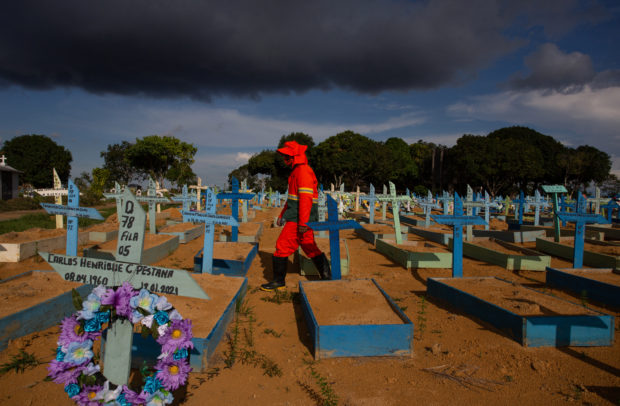
A gravedigger walks among graves of COVID-19 victims at the Nossa Senhora Aparecida cemetery in Manaus, Amazonas state, Brazil, on April 29, 2021. – Brazil, with a population of 212,000,000 people, surpassed Thursday the 400,000 deaths due to COVID-19, and is second in number only to the US. (Photo by MICHAEL DANTAS / AFP)
RIO DE JANEIRO — Brazil’s death toll in the coronavirus pandemic surpassed 400,000 on Thursday, as the country struggled to secure enough vaccines and the Senate investigated whether President Jair Bolsonaro’s government has exacerbated the crisis.
The health ministry reported 3,001 COVID-19 deaths in the past 24 hours, bringing Brazil’s overall toll to 401,186 — second only to the United States.
With 212 million people, the South American giant also has one of the highest mortality rates in the pandemic, at 189 deaths per 100,000 inhabitants — the worst in the Americas and one of the top 15 worldwide.
Brazil has been devastated by a surge in cases since the start of the year that pushed hospitals to the brink of collapse in many areas.
Although it appears to have passed the peak of the new wave, the number of daily deaths remains staggeringly high, at an average of 2,526 over the past week, behind only India.
Experts blame the latest surge partly on the “Brazil variant” of the virus, a mutation that emerged in or around the Amazon rainforest city of Manaus in December.
Known as P1, it can reinfect people who have had the original strain of the virus, and may be more contagious.
“P1 has had a very big impact. Nothing was done to contain the variant when there was a spike in January in Manaus. It was only a matter of time before it swept across Brazil,” said epidemiologist Ethel Maciel of Espirito Santo Federal University.
P1 is now circulating in 54 countries, according to the World Health Organization, which labels it a “variant of concern,” along with the so-called British and South African strains.
‘Crimes against humanity’
The country is meanwhile struggling with vaccine shortages.
Around 28 million people in Brazil have received a first Covid-19 vaccine dose, just over 13 percent of the population.
About 12.7 million have received a second.
But cities in 14 of Brazil’s 27 states have had to suspend second doses because of shortages, according to TV Globo.
In a bit of good news, the first million doses of the Pfizer vaccine were due to arrive Thursday evening, adding to Brazil’s two current options: the AstraZeneca vaccine and the Chinese-developed CoronaVac.
On Tuesday, the Senate opened an investigation into whether there was criminal neglect in the Bolsonaro administration’s handling of the pandemic.
The far-right president has controversially downplayed the virus, fought stay-at-home measures to contain it, and rejected offers of various vaccines — including, initially, Pfizer’s.
Bolsonaro defended his handling of the pandemic as the commission opened, telling supporters: “I was wrong about nothing.”
The president argues the economic damage of measures such as a national lockdown would cause more suffering than the virus itself.
But the commission’s rapporteur vowed to hold officials accountable for mishandling the crisis.
Senators will be investigating, among other things, horrific scenes such as those that unfolded earlier this year in Manaus, where dozens of Covid-19 patients suffocated to death due to oxygen shortages.
“The country has the right to know who contributed to these thousands of deaths, and they must be punished immediately,” said the rapporteur, Senator Renan Calheiros.
“There is no statute of limitations on crimes against humanity… We will wage a crusade against this agenda of death.”
Next wave?
Maciel, the epidemiologist, said authorities were still mishandling the response.
“There is zero national coordination in Brazil to fight the pandemic,” she told AFP.
And stay-at-home measures imposed by individual states to contain the latest surge are being lifted too soon, she added.
“They should have been maintained for several weeks until there was a real flattening of the curves,” she said.
“Until we have mass vaccination, we’ll still be at the mercy of each new wave.”